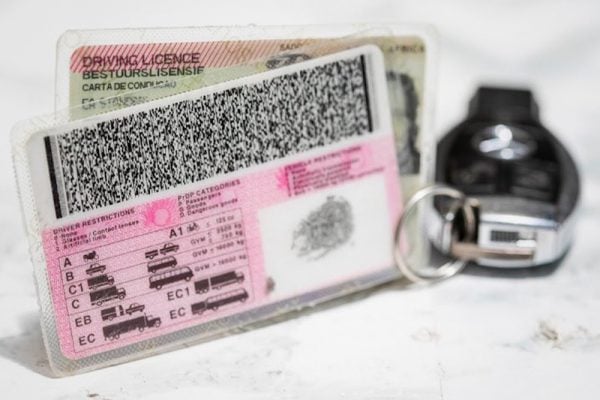By Jan Vermeulen
South Africa should scrap its driving licence card and vehicle licence discs and replace them with digital-only permits that never expire.
“There is no need for analogue documents for licensing when every driver has fingerprints, and every vehicle has a VIN,” said road safety expert and Driving.co.za managing director Rob Handfield-Jones.
This comes after transport minister Barbara Creecy revealed in response to Parliamentary questions that South Africa’s new driving licence card machines will cost the country R334 million each.
Two machines will be used at the primary driving licence card production site, with one reserved for the disaster recovery site. Together, the three machines will cost just over R1 billion.
Each machine’s price includes the required software for its operation.
When they break down, repairs will be completed locally instead of shipping the machines to Germany.
“If SARS can collect tax with an app, surely traffic officers could police drivers with an app,” Handfield-Jones argued.
“Such an app could almost certainly be developed and operationalised for a fraction of what is planned to be blown on the card printer.”
Handfield-Jones said the opaque way in which government approached the card machine tender reinforced his belief that analogue licence document production is a cash cow.
“Government will milk it ad infinitum unless the citizenry puts a stop to it,” he said.
“After all, a billion-rand machine to produce 60,000,000 cards over its 20-year lifespan works out at R16 a card — let’s say R20 if we include running costs.”
Handfield-Jones said that does not square with the Department of Transport’s over R200 card renewal fee.
“Meaning that on a charitable assessment of the facts, government stands to make nearly R11 billion in clear profit from driving licence card production every 20 years, probably much more,” he said.
“It’s a money-making racket with zero benefit to road safety.”

Handfield-Jones previously argued that road deaths have only worsened in South Africa since the implementation of expiring driving licence cards.
Therefore, they’ve had no impact on road safety and serve no purpose in a digital age.
“There is no technological or practical obstacle to digital licensing and enforcement,” he told MyBroadband.
“Rather, the problem is the Road Traffic Management Centre’s refusal to give up the revenue streams that go with analogue document production.”
Handfield-Jones said this speaks to the broader issue of the government putting revenue ahead of road safety for almost thirty years.
“Government has offered a post facto argument over the durability of both the ID book and ID cards, but there is no evidence of this having been a concern prior to 1998, or afterwards for that matter.”
According to Handfield-Jones, if one accepts the “document durability” argument, the government should insist that all other vital official documents be renewed every five years.
“It’s nonsense, but the government has somehow been permitted to advance a narrative that a driving licence is different to almost every other official document,” said Handfield-Jones.
“In my view, the reason the government recently backtracked on extending the renewal period is that the Department of Transport did its sums and realised how much renewal fee revenue would be lost.”
Regarding the practicality of digital licensing, Handfield-Jones said that the original Administrative Adjudication of Road Traffic Offences (Aarto) Act rollout intended for every traffic officer to carry a digital terminal.
Aarto is South Africa’s new law governing traffic enforcement, which was set to roll out nationally on 1 July.
The envisioned digital terminal would have enabled automatic number plate recognition and central database contact for verifying details.
“Today, a typical smartphone could achieve these functions at low cost, enabling simple roadside verification of both driving licences and vehicle licences too, which should also be digital,” said Handfield-Jones.

Handfield-Jones is not the only one raising concerns about the new card machines.
The Organisation Undoing Tax Abuse (Outa) said it had received documents from whistleblowers revealing that the cost of the new machines is far higher than initially expected.
It also said it had raised several concerns regarding the procurement of the new driving licence card machines before the transport department awarded the tender.
“Outa has for years repeatedly tried to get information from the Driving Licence Card Account and the department about the new driving licence card machine procurement process, but this has been refused,” it stated.
“The department has also refused to make public details of the various tenders and related bidders, including the awarded contract value.”
Outa was concerned the Department of Transport deliberately manipulated the tender to ensure it was awarded to a specific bidder.
This includes the department repeatedly issuing, withdrawing, and reissuing the tender, as well as implementing three extensions of the price validity period.
Outa said this was highly irregular and discouraged by the National Treasury’s procurement guidelines.
Another issue related to Idemia’s appointment as the preferred bidder. It recently had its contract with the Airports Company South Africa cancelled.
This came after a dispute between Idemia and empowerment partner InfoVerge, resulting in InfoVerge challenging the whole contract in the Gauteng High Court.
The Auditor-General is currently investigating the tender, and Creecy has asked the government agency to widen its scope.

Creecy called for investigations into several key issues, including:
- Whether supply chain management prescripts were followed to the letter.
- Whether the tender’s criteria include sufficient measures to protect the safety of personal data.
- The implications of the procurement process on the recent cancellation of ACSA’s contract with Idemia.
- Whether Idemia’s technical capacity and timeous delivery were adequately considered in the tender process following allegations from ACSA of challenges with Idemia’s biometrics system at three airports.
- Whether South African service providers were considered for the contract.
- Whether the chosen bidder was the most affordable option.
“The Auditor-General has been requested to prioritise this audit process given the current backlog for driving license card applications and the parlous state of the current printing machine,” said Creecy.
Outa has welcomed the investigation into the tender and Creecy’s request to broaden its scope.




